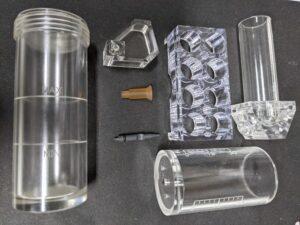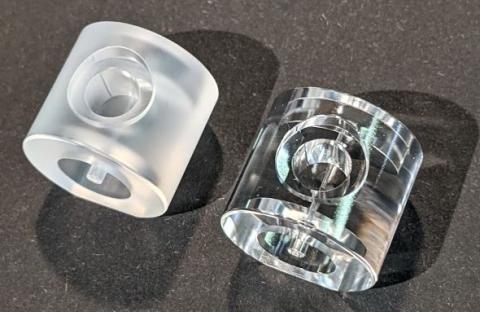| ABS | Polyethylene, HDPE, UHMW |
| Delrin, DelrinAF | Polypropylene |
| Fiberglass G10, rod and sheet | Polysulfone |
| Kel-F | PVC |
| Nylon | Rexolite |
| Phenolics, linen & paper based | Rulon |
| Plexiglass (cast acrylic) | Teflon |
| Polycarbonate (Lexan) | Vespel SP1 |

ABS (acrylonitrile, butadiene styrene) is a commonly molded and less commonly machined plastic grade that is somewhat soft and easily melted. Machining it is possible but must be done with plenty of coolant so as not to melt it. It is resistant to salts, alkalies and acids.
Delrin or Acetyl is a very common plastic of very good machinability, commonly available in white and black. It has low moisture absorption, high strength and rigidity. Delrin AF is a filled version of Delrin for use in bearing applications.
Fiberglass or G10 is a very good electrical insulator used in circuit boards and other insulating applications. It is very stiff because it is epoxy and glass fibers combined. Machining it requires some precautions both because of the dust and its affect on tools.
Kel-F is a plastic used as insulating washers in microwave equipment or anywhere a very hard, good insulator or valve seal is needed. It tends to “fuzz” up a bit at cutoff and has to be machined carefully to make good burr-free parts. It is non-flammable and has great chemical properties as well as resistance to “cold flow”.
Nylon is similar to Delrin, but a little softer and much stringier to machine, but a great low-speed bearing material. It has a slightly more yellow appearance than Delrin.
Phenolics can be more heat resistant than some of the thermoplastics because they are layers of either paper or cloth, bound together by a phenolic resin. The phenolics can be very stiff. The paper version can be tricky to machine if it is layered instead of “rolled and molded”. It sometimes tends to delaminate like plywood does.
Plexiglass has become one of our specialties. Also called Clear Cast Acrylic or methylmethacrylate, it is as clear as glass when polished. It can be bought either polished or not, and comes in varying degrees of diameter adherence. Clear cast has very good machinability when handled correctly. It is subject to stress cracking, overheating and crazing, and breakage if mishandled. Most parts that we make of it are both vapor polished for appearance and annealed to reduce stresses induced by machining or solvent welding. Sometimes further mechanical polishing is required. This plastic is also available in some colors, though colors are generally more available in the extruded version, which is a less machinable grade.

Lexan or polycarbonate has a bluish tint in rod form not apparent in thin sections. It has its own machining characteristics. It is a very high strength material, not subject to some of clear cast acrylic’s weaknesses.
Low density polyethylene is a soft plastic which in rod form appears white. It has two other grades called HDPE (high-density polyethylene) and UHMW (ultra high molecular weight). They are all readily machined but of slightly different hardnesses. The harder the better for machining. Thin-walled parts can be difficult because of the material’s flexibility.
Polypropylene is another Polyolefin like polyethylene and has similar properties. It is heat-weldable, has good machinability and resists organic solvents like its cousin, but is more heat resistant and more stable dimensionally.
Polysulfone is a very hard, Teflon-like material that can be autoclaved. We recommended it to a customer who wanted to sterilize it by autoclaving. It is FDA compliant, a great electrical insulator and has a brownish translucent color. It has better machinability than Teflon.
Rigid PVC is available in gray, black, clear, red, yellow, blue and other colors. The letters stand for polyvinyl chloride. It has good chemical resistance. It has a low temperature tolerance, which makes machining it more difficult. Good coolant flow is essential to avoid melting. It is remarkably abrasive for a plastic, and will dull coated carbides or anything else more easily than would be expected. It machines well with these precautions, but leaves messy burrs that can sometimes only be carved out with a knife.
Rulon is a reinforced Teflon-filled material used for low speed bearings and sliding valve seals. It has good electrical and excellent chemical resistance. It is very expensive and difficult to deburr because of its stringiness.
Teflon is a high temperature plastic which is subject to changing shape when under pressure and can deform considerably after machining. The use of heat-treated Teflon can avoid some of the machining pitfalls associated with it. It is very white, a great electrical and heat insulator, nearly chemically inert and has a very low coefficient of friction.
Vespel SP1 is the base resin, unfilled with lubricant or graphite. It is highly resistant to wear and creep, and can be substituted for metal in some applications. It can be purchased filled with as much as 40% filler for greatly improved lubrication.